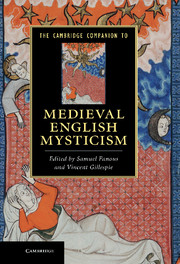Book contents
- Frontmatter
- Contents
- List of contributors
- Preface
- Chronology
- List of abbreviations
- 1 Introduction
- 2 c. 1080–1215: culture and history
- 3 c. 1080–1215: texts
- 4 1215–1349: culture and history
- 5 1215–1349: texts
- 6 1349–1412: culture and history
- 7 1349–1412: texts
- 8 1412–1534: culture and history
- 9 1412–1534: texts
- 10 1534–1550s: culture and history
- 11 1534–1550s: texts
- Guide to further reading
- Glossary of theological terms
- Index
- References
5 - 1215–1349: texts
Published online by Cambridge University Press: 28 July 2011
- Frontmatter
- Contents
- List of contributors
- Preface
- Chronology
- List of abbreviations
- 1 Introduction
- 2 c. 1080–1215: culture and history
- 3 c. 1080–1215: texts
- 4 1215–1349: culture and history
- 5 1215–1349: texts
- 6 1349–1412: culture and history
- 7 1349–1412: texts
- 8 1412–1534: culture and history
- 9 1412–1534: texts
- 10 1534–1550s: culture and history
- 11 1534–1550s: texts
- Guide to further reading
- Glossary of theological terms
- Index
- References
Summary
The previous chapter suggests that the canons issued under the authority of Pope Innocent III on the occasion of the Fourth Lateran Council of 1215 officially licensed, codified, and reinforced newly emerging trends in the clerical practice of pastoral theology. This foundational moment in the history of the western church had a lasting effect on the way the medieval self was to be shaped. The Lateran documents shaped medieval religious psychology and its attendant literature by encouraging the production of pastoral manuals and manuals of confession to assist priests in the exercise of their new responsibilities in the care of souls (cura animarum). Canon 10 of the Fourth Lateran Council acknowledges that bishops may require the support of capable men who, in lieu of the bishop, will preach in his diocese. The continuing implementation of this legislation in England produced further constitutions, including influential sets by Bishop Richard Poore (d. 1237) of Salisbury in 1222, and Bishop Robert Grosseteste (c. 1170–1253) of Lincoln in 1239. These diocesan constitutions were codified for the whole of Canterbury Province (and in effect for the whole of England) in the 1281 Lambeth Constitutions of Archbishop John Pecham (d. 1292). Through such routes basic catechetical material was circulated for the use of parish priests in the pastoral care of their flock.
- Type
- Chapter
- Information
- The Cambridge Companion to Medieval English Mysticism , pp. 91 - 112Publisher: Cambridge University PressPrint publication year: 2011
References
- 4
- Cited by



